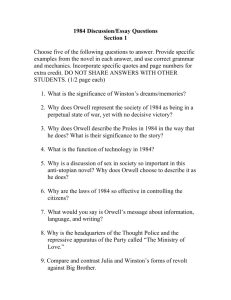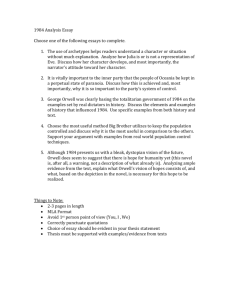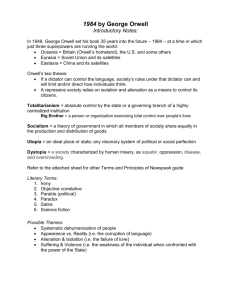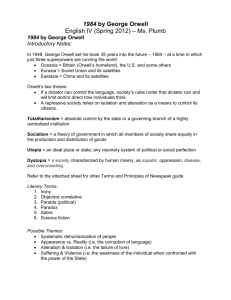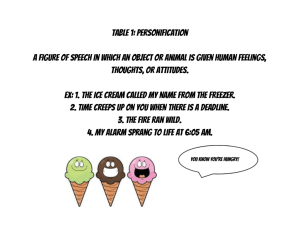عرض تقديمي من PowerPoint
advertisement
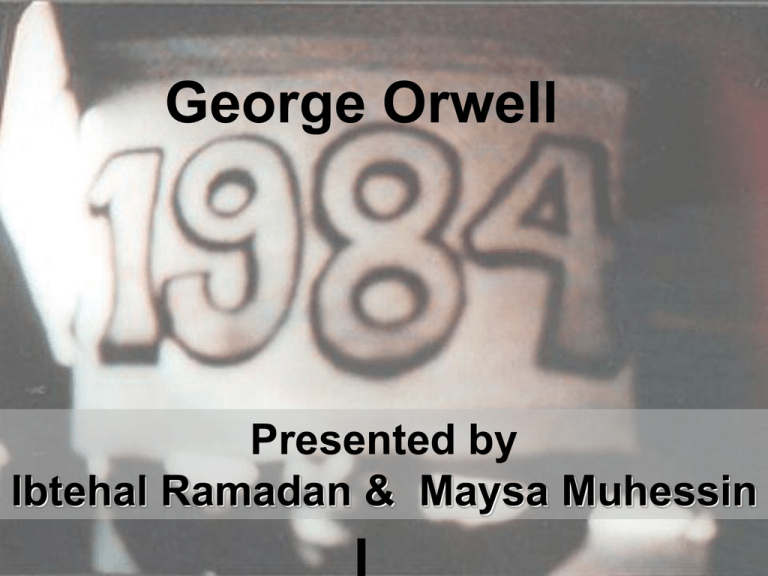
George Orwell Presented by Ibtehal Ramadan & Maysa Muhessin Outline: •About the Author, About 1984. •Historical Background. •Plot Summary. •Characters, Setting, Narrative style. •Themes, Motifs & Symbolism. •Aim of Orwell. •Irony & Imp. quotations explained. About the Author: •Eric Blair was born in 1903 in Bengal ,a British colony •His father worked for the Opium Department of Civil Service. •Distinct during his school days. •He managed to get scholarships toWellington and Eton colleges. •Joined the Indian Imperial Police in Burma. •He resigned with a hatred to imperialism. •He adopted his pen name in 1933. •Orwell lived for several years in poverty, sometimes homeless. •Orwell volunteered to fight for the Republicans against Franco’s Nationalist uprising, and was shot on 1937. • Orwell began supporting himself by writing in 1940. • Orwell died at the age of 46 from tuberculosis. Orwell’s Political Views: •He considered himself a democratic socialist and was critical of communism. •He hated intellectuals, lying, cruelty, political authority, and totalitarianism. •He strongly opposed Stalin and Hitler – he was very outspoken during WWII. About The title : •The Last Man in Europe •Originally the title was going to be 1948 may be an allusion to the centenary of the Fabian Society, a socialist organization founded in 1884. A vision of the future but also a comment on the present. • The influence of his Life on 1984: •His life in the Indian Burma Police and his experiences with censorship in the BBC for models of authoritarian power. •His work for the overseas service of the BBC, which at the time was under the control of the Ministry of Information, also played a significant role as the basis for his Ministry of Truth •Danger of totalitarianism. • A study of psychological control and thought manipulation. •The novel is about a dystopian society in which every movement is tracked. •A grey soulless society, where people are unemotional. •Behavioural and physical manipulation, even unauthorised mannerism could lead to an arrest. How it may be prophetical? •The use of technology and language to suppress free thought and monitor people's actions. •Language acts as a powerful force in society. •It structures human thought and allows those thoughts to be communicated. •It can be means to achieve control over people. (Newspeak). (my emphasis .4) •The radical statement of Orwell in 1984 is : How progress in technology is not always a force for good Orwell presents the hardships of the proles' ( M. Illustr.) The high party official breaking the roles. like O'Brien lives in luxury and have the ultimate privilege of being able to turn off the telesceen Historical Background: • It was written at the end of WWII. •As a warning from the future of the novel, to be avoided. •During his time, tyranny was a reality in Spain, Germany, the Soviet Union. •Economical & social situation: no freedom, Hunger, force labour,& mass execution. •A vision of “Democratic Socialism” •The Oceania is a semi exact reflection, though fictional , of a society similar to Hitler’s & Stalin. •Complete repression of the human spirit, absolute governmental control of daily life, constant hunger. •Systematic “vaporization” of individuals who do not, or will not, comply with the government’s values. •Big Brother is recognizable (he is physically similar to both Hitler and Stalin, The Plot The plot consists of three main parts: -The first part: deals with the world of 1984 as seen through the eyes of Winston. -The second part: deals with Winston forbidden relationship with Julia and his eagerness to rebel against the party. -The third part: deals with Winston’s capture and torture. The Characters: Winston Smith - He is the protagonist and main character and narrator of the story. - He is 39 years old . - He secretly hates the Big Brother The Characters: Julia - Winston’s 25 year old secret lover. - She is optimistic and her rebellion is small and personal. The Characters: O'Brien - He is a member of the Inner-Party. - He learns that Winston has a rebellious tendencies , therefore, he destroys him. The Characters: Big Brother - He is the Mysterious omnipresent figurehead who is the embodiment of all the ideals of the party. The Minor Characters - Emmanuel Goldstein : * he is the leader of the rebels and designated enemy of the citizens. The Minor Characters Mr. Charring ton : - He is a secret member of the thought police. - He owns and operate an antique store. - He rents Winston and Julia a room as a trap for O'Brien. The Political Geography The Political Geography The world was controlled by three functionally similar totalitarian super states: - Oceania. - Eurasia. - Eastasia . The Settings - Oceania. - Mr. Charring ton’s rented room. - Ministry of Love. The Narrative - The novel is written in the first person narrator. - It is futuristic narration. The Style - It is very descriptive and informative style. - It portrays terrifying images and conveys horrifying truth. - Foreshadowing and suspense is used to heighten this exciting novel. Themes: •Nationalism •The Dangers of Totalitarianism •Psychological Manipulation •Physical Control •Control of Information and History •Technology Motifs: •Doublethink •Urban Decay •Symbols •Big Brother •The Glass Paperweight and St. Clement’s Church •The Place Where There Is No Darkness •The Telescreens Irony - Irony in 1984 by George Orwell abounds. -The novel itself, on the surface a satire on negative Utopian novels. - The ironic names of ministries. - The ironic use of doublethink. Ironic Quotes “War is Peace; Freedom is Slavery; Ignorance is Strength” “ It is a warfare of limited aims between combatants who are unable to destroy one another, have no material cause for fighting , and are not divided by any genuine ideological differences” The Aspect of Time “Who controls the past controls the future. Who controls the future controls the past” The Aspect of Time “And when memory failed and written records were falsified—when that happened, the claim of the Party to have improved the conditions of human life had got to be accepted, because there did not exist, and never again could exist, any standard against which it could be tested” Quotes about 1984: Walter Cronkite, 1983 “What Orwell had done was not to foresee the future but to see the implications of the present -- his present and ours - and he touched a common chord. He had given words and shapes to common but unarticulated fears running deep through all industrial societies.” “While here he is a novelist, he is also a sharp political essayist and a satirist with a bite not felt in the English language since Jonathan Swift “ “1984 is an anguished lament and a warning that vibrates powerfully when we may not be strong enough nor wise enough nor moral enough to cope with the kind of power we have learned to amass “ That’s all! Thanks for your tolerance Hope You’d enjoyed it.
